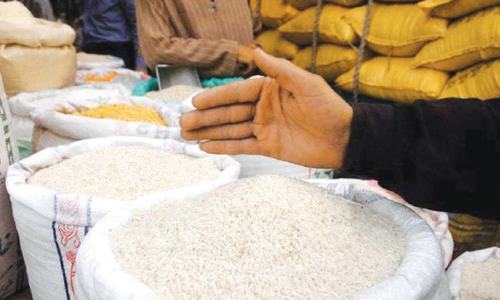
Once upon, more than two decades ago, Pakistan and India cooperated. In response to a US patent for strains of rice that could be sold as basmati, both countries jointly filed a petition with the World Trade Organisation (WTO) seeking to prevent US-grown rice from being marketed as basmati. About 50,000 people protested outside the US embassy in India against the patent with the tacit understanding that it is only the two countries in the sub-continent that grow and export the premium strand of rice.
Eventually, the countries were victorious and both started the process of Geographical Indication (GI) law. In 2010, GI status was granted to basmati rice grown in seven states, excluding Madhya Pradesh. Indian media sources indicate that apex bodies Agricultural & Processed Food Products Export Development Authority (Apeda) and the Indian Council of Agricultural Research blocked MP’s inclusion owing to the state neither having a history nor the specific agro-climatic for growing basmati.
Madhya Pradesh has been fighting to be conferred GI status since then though it is feared in India that its inclusion may dilute Indian Basmati rice in terms of characteristics and quality parameters giving Pakistan as an advantage.
It is widely believed that domestic infighting between states prevented India from contesting Pakistan’s claim for basmati in international courts till recently (though the countries have come to loggerheads over the issue several times). But the recent Indian application for the long-grain aromatic rice to be recognised by the European Union as being grown exclusively in specific regions of India has shaken Pakistani rice stakeholders to the core.
‘If the impression is created that it only originates from India, then our exports will definitely take a hit’
Fearful of breathing a word that could impact Pakistan’s case in court, they refuse to consider any possibility that the country will not emerge victoriously.
And they have every reason to believe so. On condition of anonymity, a source in the know gave an example of evidence that Pakistan has to support its claim for basmati rice. In 2006-2007, a case was filed in the Sindh High Court by a local basmati growers association for domestic GI ownership of basmati rice. The claim was contested by the Rice Exporters Association of Pakistan (Reap) asserting state ownership and hence in the hands of Trade Development Authority of Pakistan (TDAP). India’s Apeda became a party to the suit as well.
This is significant because it gave us tacit documentation that India accepts Pakistan’s claim of growing the premium rice in our region as well which can be used to contest our rival’s current application in the EU.
“It is all about branding for the customer. If the impression is created that basmati rice only originates from India, then our exports will definitely take a hit,” says Yasir Shafi, director of Shafi Gluco Chem, an exporter of rice’s value-added products.
“Pakistan’s basmati rice is priced on the higher side because of EU’s pesticide restrictions that edge Indian exports out. Rice is the largest export after textiles. Going forward, the current account deficit may go up again and the rupee will depreciate. We cannot continue to rely on the International Monetary Fund for support. TDAP needs to be more proactive to support exports,” he says.
A source in the know agreed that the government has always been reactive and acts on a need basis. While Reap’s application for GI tagging has been languishing for two decades, it has speeded up in the last few years.
“In the past, India has said that Pakistan’s basmati is not original, it is a hybrid of two or three different seeds,” says Dr Manzoor Ahmed, former ambassador to WTO talking about his tenure. “We contested it; the case was fought in Brussels and amicably settled in around 2004.” While the purpose at that time was duty-free access and not GI tagging, the European community accepted Pakistan’s claim of basmati.
Talking about the process, Dr Ahmed explains that domestic legislation needs to be in place first, defining what is basmati rice and the regions within Pakistan that it is grown. Only then we can go to the EU to contest India’s assertions. While GI law exists in Pakistan, the nuts and bolts are not in place.
When questioned about the progress, the Reap’s chairman Abdul Qayum Paracha chose not to comment owing to the sensitivity of the issue, begging the question whether sufficient progress has been made in a law that has been languishing for two decades.
Another problem waiting in the wings is provincial politics once GI tagging is in place. A source confirmed that while stakeholders are holding hands and cooperating at the moment, a tiff between the two rice-growing provinces Sindh and Punjab may be brewing.
The impression generally is of bated breaths and hope. If India wins, not only will it affect Pakistan’s roughly half a billion dollar exports to Europe, it may start a domino reaction impacting Middle East markets. Given the decades of evidence of Pakistan’s claim as growers of the aromatic rice, however, there is every reason to believe that the worst-case scenario will remain in the realm of nightmares for the rice sector.
Published in Dawn, The Business and Finance Weekly, November 2nd, 2020














































